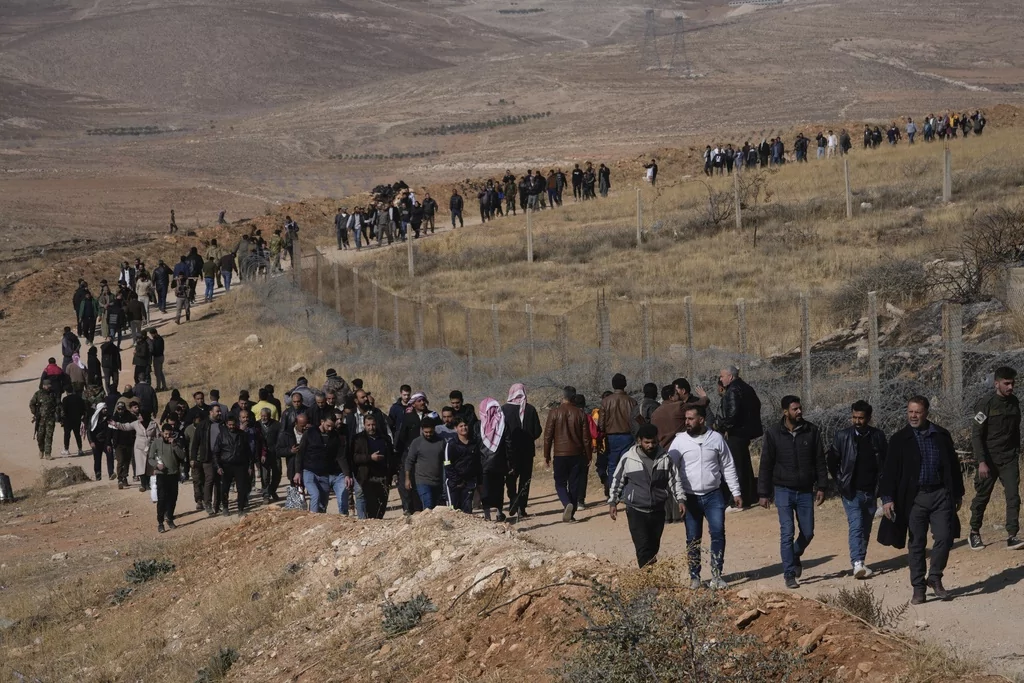
The fall of former President Bashar Assad‘s regime in Syria creates a new wrinkle in a long-standing U.S. security concern: the thousands of detained Islamic State fighters held in prisons controlled by the Syrian Democratic Forces.
Several current and former defense officials warned prior to the fall of Assad that the prisons, along with the refugee camps filled with the wives and children of those fighters, could represent a new generation of ISIS fighters if the West didn’t act, in particular by repatriating and rehabilitating those people.
Officials, including President Joe Biden, have declared that the United States would not allow ISIS to reconstitute in light of the current instability, and the military has launched dozens of strikes targeting ISIS combatants and their camps. A major concern for both the U.S. and Israel is ensuring the Assad forces’ weapons stockpiles don’t fall into ISIS’s hands or those of any other group looking to harm Western interests.
The U.S. acknowledged earlier this month for the first time that there are about 2,000 troops in northeast Syria, where they operate alongside the Kurdish-led SDF. Prior to this week, DoD had said there were only about 900 troops in the country, even though the increased number of troops have been in place for “at a minimum, months,” according to Pentagon spokesman Maj. Gen. Patrick Ryder.
Despite the U.S. and Turkey being allies, as well as their participation in NATO, the latter considers the SDF an extension of the Turkey-based Kurdistan Workers’ Party, or PKK, which both the U.S. and Turkey have designated as a foreign terrorist organization. Turkish President Recep Tayyip Erdogan is looking to capitalize on Assad’s fall.
Turkey has built up a military presence along the border, and a possible conflict between them and the Kurds could force them to redirect assets from the prisons in their territory where they are guarding the ISIS fighters.
U.S. officials have brokered a temporary ceasefire between the two sides and are hoping they can broker another deal to avoid further violence or escalation.
The U.S. “now is trying to tell the Turks to back off when it comes to our Kurdish allies, and to make sure that we don’t impact them and affect not only their ability to safeguard those prisoners at those prisons but also they have to retain the capability to deal with ISIS,” former Defense Secretary Mark Esper told the Washington Examiner.

Since the fall of Assad, Syrian civilians and nonprofit groups have sought to uncover the former dictator’s secret prisons, to which countless people had been taken, tortured, and held extrajudicially in some cases for many years. For many families, they had no idea what happened to a loved one who simply disappeared. An American, Travis Timmerman, was freed from one of those prisons, while several organizations are trying to locate long-held American journalist Austin Tice.
A foreshadowing of what could occur took place in January 2022 at the Hasakah prison when ISIS launched an attack in an attempt to free its detained fighters.
The battle, which lasted for more than a week, began with a car bombing along the facility’s perimeter before militants then attacked from several different directions, while the prisoners started to riot. More than 370 ISIS fighters were killed, while about 115 SDF fighters were also killed in the attack, more than 70 of which were prison guards, according to the Middle East Institute.
“One area in Syria that I wish we had been more successful in, is in motivating international partners to repatriate ISIS prisoners from their countries. It’s a burden that the SDF have primarily dealt with on their own, and the only long-term solution actually is repatriation,” Gen. Frank McKenzie said in March 2022, days before the end of his role as commander of U.S. Central Command.
Even after the Hasakah prison break, many Western countries have been hesitant to accept the repatriation of their citizens who left to join ISIS.
“We also need to reintegrate thousands of [internally displaced persons], many of whom are family members of ISIS fighters. We need to get them back into their communities in order to prevent vulnerable children from being indoctrinated into the ISIS ideology,” he added. “And if we don’t do that, we’re going to face ISIS 2.0 down the road.”
McKenzie’s successor, Gen. Michael Kurilla, visited the al-Hol and al-Roj displaced persons camps in northeast Syria in August 2023, and he, too, stressed the importance of repatriating those people.
“Our continuing multinational effort to repatriate the residents of the camps to their countries of origin not only enhances security and stability in the region but, more importantly, eases this humanitarian challenge,” he said after the visit.
In another example, when the Taliban overthrew the Ghani government in Afghanistan in 2021, they proceeded to empty the prisons at Pul-e-Charkhi and Bagram, and one of the ISIS terrorists who was freed, Abdul Rahman al Logari, went on to carry out the suicide bombing outside Abbey Gate airport in Kabul, killing about 170 people, including 13 U.S. troops who were there helping evacuate at-risk civilians as the U.S. mission in Afghanistan came to an end.
President-elect Donald Trump has said he believes the U.S. should stay out of Syria’s instability. During his first term, he announced the withdrawal of U.S. forces from Syria but was persuaded otherwise.
Trump’s incoming national security adviser, Rep. Mike Waltz (R-FL), said the U.S. “cannot have an explosion of ISIS back into a caliphate” during an interview this month on Face the Nation.
CLICK HERE TO READ MORE FROM THE WASHINGTON EXAMINER
“We cannot have an explosion of ISIS back into a caliphate that threatens Iraq, threatens Jordan, threatens Turkey and Europe, inspires attacks in the United States, like we saw in 2014. President Trump cleaned it up then with his team,” he said. “Thousands of ISIS fighters are in prison camps. We’re in consultation with the Israelis as well. They’re importantly taking down Assad’s chemical stockpiles, as well as other things we don’t want falling into the hands of anybody.”
ISIS doesn’t hold the territory it once did in Iraq and Syria at the height of its caliphate, but the ideology remains, as well as its ability to carry out attacks. From January through June 2024, ISIS claimed more than 150 attacks in Iraq and Syria, which was on pace to more than double the total number of attacks it claimed the year before, according to CENTCOM.






